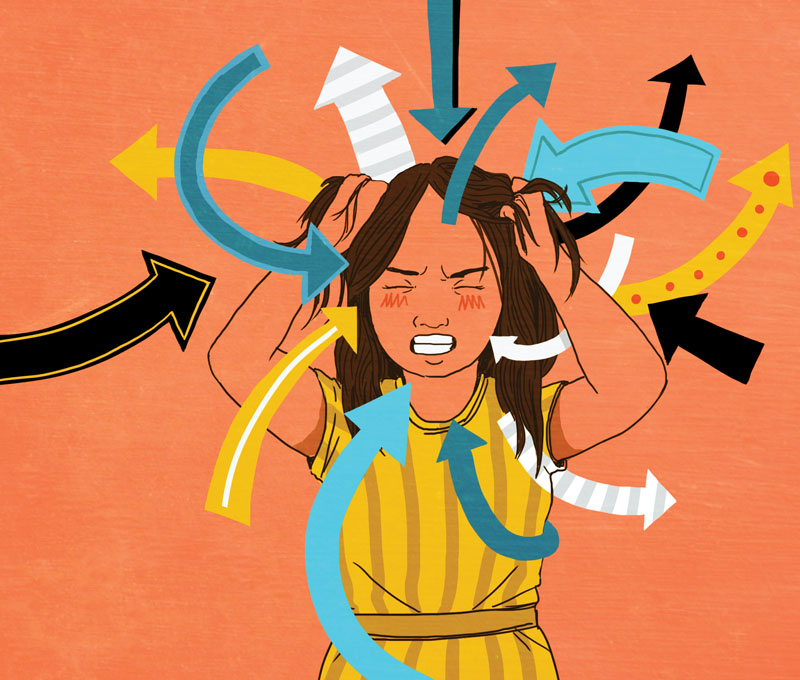
As a licensed professional counselor with a specialization in ADHD coaching, I have had the opportunity to work with many adult women who have been struggling with undiagnosed ADHD. What I have found is that a common theme among these women is the belief that something is wrong with them. This feeling has been present throughout their entire lives, causing emotional, mental, and social turmoil.
I myself can relate to this feeling, as I too struggled with undiagnosed ADHD for many years. I remember feeling like I was constantly failing, no matter how hard I tried. I struggled with procrastination, forgetfulness, and impulsivity, all of which I internalized as personal flaws. I thought I was just lazy or crazy, and I believed that I was the only one who felt this way.
Many of the women I have worked with have expressed similar feelings. They describe a constant sense of chaos in their lives, as if they are always one step behind. They feel like they are not living up to their full potential, and that they are letting themselves and others down. They often describe themselves as “scatterbrained” or “spaced-out,” and they struggle to stay organized and focused.
To cope with these challenges, many women with ADHD engage in what is known as “masking.” Masking involves hiding one’s symptoms, often through hyperfocus or other coping mechanisms, in order to appear more “normal” or to avoid being stigmatized. While masking can be helpful in certain situations, it can also be incredibly exhausting. Women who mask often report feeling like they are living a double life, constantly putting on a façade of competency while feeling like they are barely holding it together on the inside.
This exhaustion can then lead to further problems, such as unfinished tasks, increased depression and anxiety, and feelings of guilt and shame. Many of the women I have worked with describe feeling like they are imposters, like they don’t really belong in social or professional settings. They feel like they are always “faking it” and that they will be found out as frauds.
Despite all of these challenges, many women with ADHD have gone years without a proper diagnosis or treatment. They have gone to doctors, teachers, and parents for help, only to have their symptoms minimized or dismissed. This can be incredibly damaging, as it reinforces the belief that something is wrong with them and that they are not worth taking seriously.
To provide some more detailed and illustrative examples of how the belief that something is wrong with them has affected the lives of women with ADHD, let’s consider a few common scenarios.
First, let’s consider the experience of a woman who struggles with procrastination and forgetfulness. Despite her best efforts, she always seems to be running behind on deadlines and forgetting important details. She may have difficulty keeping up with her work or school responsibilities, which can lead to feelings of guilt and shame. She may also be afraid to ask for help, for fear of being judged or criticized. All of these factors can contribute to a sense of inadequacy and self-doubt, which can be incredibly damaging to one’s self-esteem.
Another common scenario involves the experience of a woman who struggles with impulsivity and emotional dysregulation. She may find herself becoming overwhelmed by even minor stressors or criticism, leading to outbursts of anger or tears. She may struggle to maintain stable relationships or to make meaningful connections with others, which can lead to feelings of loneliness and isolation. In addition, she may struggle with imposter syndrome, feeling like she doesn’t belong in social or professional settings and that others will discover that she’s not as competent as she appears.
Finally, let’s consider the experience of a woman who has been masking her ADHD symptoms for years, perhaps without even realizing it. She may have developed elaborate coping mechanisms, such as hyperfocus or meticulous organization, to compensate for her difficulties with attention and focus. While these coping mechanisms may help her to appear more “normal” to others, they can be incredibly draining and exhausting. She may feel like she’s constantly “putting on a show” or living a double life, which can lead to feelings of anxiety and depression. Over time, she may become increasingly isolated and withdrawn, as she struggles to maintain the facade of competency.
These are just a few examples of the ways in which the belief that something is wrong with them can affect the lives of women with ADHD. It’s clear that addressing this issue requires a comprehensive and multifaceted approach, including education, support, and access to mental health services. By working together to address the unique challenges faced by women with ADHD, we can help them to build confidence, self-esteem, and resilience, and to achieve their full potential in all areas of their lives.
It is crucial that we recognize the unique challenges faced by women with ADHD and provide them with the support and resources they need to thrive. This includes better education about the symptoms of ADHD, as well as access to mental health professionals who are trained in working with adults with ADHD. It also means creating a more supportive and understanding environment, in which women with ADHD are not stigmatized or made to feel like they are defective.
As a counselor, I am committed to helping women with ADHD overcome these challenges and thrive in all areas of their lives. Through therapy, coaching, and education, we can work together to develop strategies for managing symptoms, building self-esteem, and achieving success on their own terms. With the right support, women with ADHD can learn to embrace their strengths and live fulfilling and productive lives.
It’s important to understand that ADHD is a neurodevelopmental disorder that affects the way the brain functions. It’s not a personal failing or a character flaw, and it’s not something that can be overcome through willpower or effort alone. Women with ADHD need access to the same support and accommodations that are available to other individuals with disabilities, including accommodations in the workplace and in educational settings.
Another important aspect of helping women with ADHD is addressing the issue of co-occurring mental health conditions, such as anxiety and depression. These conditions are common in individuals with ADHD and can be especially debilitating. It’s important for mental health professionals to be able to recognize and address these conditions in their clients, and to provide a comprehensive treatment plan that addresses all aspects of the individual’s mental health.
In conclusion, it’s clear that the belief that something is wrong with them has had a profound impact on the lives of many adult women with ADHD. It’s time to recognize the unique challenges faced by these individuals and to provide them with the support and resources they need to thrive. As a counselor and ADHD coach, I am committed to helping women with ADHD overcome these challenges and live fulfilling and successful lives. With the right support and understanding, women with ADHD can achieve their full potential and make meaningful contributions to society.

